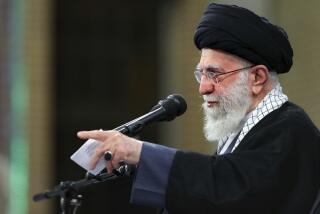U.S. to Pay Iranians Who Lost Kin on Downed Plane
WASHINGTON — At a time when the United States is trying to defuse tensions with Iran, the U.S. government said Thursday that it will pay almost $62 million to the families of 248 Iranians killed when an American warship shot down an Iran Air passenger plane over the Persian Gulf in 1988.
No money will go to the Iranian government.
The settlement does not signal a change in relations with Iran, said State Department spokesman Nicholas Burns. “There is no change to our opposition to objectionable Iranian policies such as support for terrorism and pursuit of weapons of mass destruction.”
Yet it comes as the Clinton administration, alarmed that the United States and Iran may be heading toward some kind of collision, is sending strong signals to Tehran that it does not want any kind of showdown, according to senior administration officials.
One Pentagon official said: “The political pressure in both countries has increased the rhetoric and actions in dangerous ways.”
The accident settlement ends a long dispute. Past U.S. administrations stuck to the claim that the U.S. action, which killed 290 people, was defensive. But the Iranian airbus was clearly a civilian flight.
Under the settlement, which came after Iran agreed to drop its case at the International Court of Justice in The Hague, the United States will pay $300,000 for each wage earner killed and $150,000 for each non-wage earner, Burns said. Survivors of Italians and other nationalities aboard the plane already have been paid.
One recent source of the deteriorating relationship between the United States and Iran was last week’s arrest, by North Atlantic Treaty Organization troops in Bosnia-Herzegovina, of Iranians equipped with weapons and explosives who appeared to be running an extremist cell.
The Clinton administration also has been “deeply disturbed” about increasing Iranian surveillance of U.S. diplomatic personnel and facilities in the Middle East, the Balkans and Central Asia, the official said.
Three other factors have sparked growing U.S. concern. First, Tehran is expanding production of long-range missiles and chemical weapons--both primitive mustard gas and more sophisticated nerve gases such as sarin, the Pentagon reports.
Second, most of Iran’s recently purchased conventional weaponry is offensive systems that could disrupt Persian Gulf shipping.
Third, Iran remains the most active opponent of the U.S.-orchestrated Middle East peace process.
But the officials are also worried about recent signals from the U.S. Congress. Last year, House Speaker Newt Gingrich (R-Ga.) called for a $20-million appropriation for covert operations designed to oust Iran’s Islamic government--a move that Iran saw as a violation of the 1981 accord that brought freedom for 52 American hostages held in Tehran in exchange for a U.S. vow to keep out of Iran’s internal affairs.
More to Read
Sign up for Essential California
The most important California stories and recommendations in your inbox every morning.
You may occasionally receive promotional content from the Los Angeles Times.










